 MyDogBreeds
MyDogBreedsBoth Silken Windhound and Aussie Poo are originated from United States. Both Silken Windhound and Aussie Poo are of same height. Silken Windhound may weigh 10 kg / 22 pounds lesser than Aussie Poo. Silken Windhound may live 3 years more than Aussie Poo. Both Silken Windhound and Aussie Poo has almost same litter size. Silken Windhound requires Low maintenance. But Aussie Poo requires Moderate maintenance
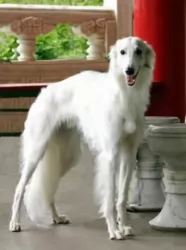 The Silken Windhound is a breed intentionally developed by Borzoi and Deerhound breeder, Francie Stull. Although the first litter of the Windhoud was not born until 1995, their development began in discussions ten years later. Bred as a cross between her beloved Deerhounds and Borzoi, the first Society for the breed formed in 1999 and they were recognized by the UKC in 2011.
The Silken Windhound is a breed intentionally developed by Borzoi and Deerhound breeder, Francie Stull. Although the first litter of the Windhoud was not born until 1995, their development began in discussions ten years later. Bred as a cross between her beloved Deerhounds and Borzoi, the first Society for the breed formed in 1999 and they were recognized by the UKC in 2011.
Ms. Stull wanted another breed for her kennel and decided on a smaller sighthound than her Borzoi. She wanted a long coat, a good temperament, good health, and possessing the same athletic abilities, grace and poise as the sighthounds that are larger. She developed the Silken Windhound based on this vision.
With this in mind, the kennel purchased the pick of a litter from the American and English Borzoi Champion bitch, Stillwater Virginia Reel. This puppy was eventually bred to Stillwater White Lightning and produced puppy that was a blue brindle. This dog, Stillwater Kristull Peacock, had the coat, personality and structure that Ms. Stull wanted for the new breed. She was bred to Deerhound Windsprite Autumnal Xenon to form the foundation for the Silken Windhound.
Over time champion Borzoi were bred with multi-generation Whippet based dogs and small Whippet from coursing and show lines. Finally, all of this work was rewarded with an incredible little sighthound to fit in the line of sighthounds between the giant and large breeds and the smaller whippet type breeds.
The Silken Windhound lives today in 24 different countries. They take their place in hound competitions all over the world in obedience, lure coursing, and racing. They are a Limited Stake Breed in the ASFA and competed with 40 other dogs in 2010. Then they were accepted by the NOFCA or National Open Filed Coursing Association, also in 2010. Finally, in 2011 they were fully accepted by the UKC.
The Silken Windhound is recognized in addition to the UKC, by the Dog Registry of America, the Rarities Inc., the American Canine Association, the Kennel Club of Slovenia, the American Pet Registry, Inc., the International Silken Windhound Society and the International, All-Breed Canine Association of America.
Aussiepoo is a hybrid breed mix of purebred Poodle and Australian shepherd. If one of the parents is miniature Poodle, the Aussiepoo will be smaller than usual - mini Aussiepoo. We do not know precisely their origin, but we know that this beautiful mix is originating from USA, Australia and Canada.
Breeders can't really know how pups are going to look like until they are born. No one actually can control the combination of the genes. Usually, Aussiepoo is silky-fur playable and friendly dog, and that is always more than enough for Aussiepoo lovers.
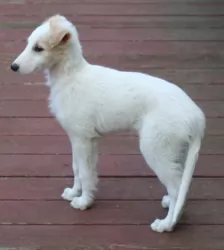 The Silken Windhound is a breed of beautiful, athletic medium sized dogs. They have the long coat, athletic build and classic lines of the sighthound/coursing dog. Just looking at them and you know they have strength, balance and grace in those medium sized bodies. Their running ability is exceptional. They perform well in the confirmation rings.
The Silken Windhound is a breed of beautiful, athletic medium sized dogs. They have the long coat, athletic build and classic lines of the sighthound/coursing dog. Just looking at them and you know they have strength, balance and grace in those medium sized bodies. Their running ability is exceptional. They perform well in the confirmation rings.
They are sine boned, balanced with smooth muscles – a sleek hardy looking dog. They have almond-shaped, large, dark eyes with small folded ears. Looking in their faces you see intelligence, friendliness and alertness. The head is long with a well balanced muzzle and a dark, slightly down-turned nose. Her lips are dark and full and her neck long and slender. The Silken Windhound must have a flexible loin because they have a gallop of double suspensions and are amazingly fast. A deep chest is also a must with a flexible, curving tail. Her legs are straight and long, as she is built for speed.
Every Aussiepoo depends on the size of the Poodle that was bred. If the parents are smaller than usual, the puppies will be smaller. Their colour also depends on the colour of the parents, and a litter can have puppies of a different colour. Their bodies are usually very muscled, with strong bones, but if you are not an outdoor type, there is a chance that your Aussiepoo will be obese. They are very active and they need a well-balanced diet.
These dogs are easy to train since they are intelligent and people oriented and you can train them while they are still puppies. Aussiepoo is generally friendly with strangers, always ready to play with children and they get along with other pets and animals. This breed is very affectionate and they like their humans to be close so it’s not recommendable to raise them to be loners.
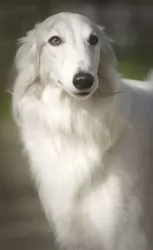 1. Children friendliness – they are great with children and would romp with them all day.
1. Children friendliness – they are great with children and would romp with them all day.
3.Adaptability Like most sighthounds they can be couch potatoes but being medium sized they can live just about anywhere as long as it is inside.
4.Learning ability - They are smart but their learning ability can be hampered by their stubbornness.
Aussiepoo is a friendly kind. They are always ready to run and play with children, and they will tend to keep the children together (genes of the Australian shepherd). They are so playful that they will see no difference between an infant and a five-year-old, so be present if there are small children unstable to walk alone.
Except the fact that they love water and that they are great swimmers, they have many agility talents.
Since Aussiepoo is a loving, caring and sweet kind of dog, they will fit in anywhere you take them.
They are super friendly with strangers, and that can be an issue if you don’t keep an eye on them. But, they should never be left alone, or leash free outdoors. They are not so good as a guard dog, so if you tend to keep him inside with stay-at-home family member, this breed if no a good choice.
They generally learn quickly. Therefore, they are easy to train. They respond better to the prize training methods.
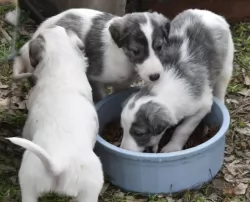 Most inherited diseases and conditions are rare. There is some drug related sensitivity, especially to ivermectin, and some dogs carry a MDR1 (multi-drug resistance gene) that is defective. Breeders are attempting to breed this out of the Silkens. A few other rare instances of concern include:
Most inherited diseases and conditions are rare. There is some drug related sensitivity, especially to ivermectin, and some dogs carry a MDR1 (multi-drug resistance gene) that is defective. Breeders are attempting to breed this out of the Silkens. A few other rare instances of concern include:
Risk of: eye cataracts, hip dysplasia (malformation of the ball and socket joint), epilepsy, progressive retinal atrophy (degeneration of the retina cusing progressive vision loss culminating in blindness), sebaceous sdenitis (an inflammatory skin disease that affects the skin glands), bloat, nasal solar dermatitis (sun sensitivity).
Pelger - Huet syndrome (abnormalities in blood cells. PHA testing is advised with this dog breed. PHA is inherited and dangerous only if both parents carry this abnormality.)
Von Willebrand's Disease (inherited bleeding disorder caused by a deficiency in the amount of a specific protein needed for blood clotting. It can be detected by buccal mucosal screening.)
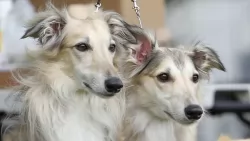 1.Feeding the puppy This is a medium sized, active breed. They need high quality dog food with plenty of protein. Feed them 3 times a day from a food made for high energy active medium sized breeds.
1.Feeding the puppy This is a medium sized, active breed. They need high quality dog food with plenty of protein. Feed them 3 times a day from a food made for high energy active medium sized breeds.
2.Feeding the adult - Feed them 2 times a day from a food made for high energy active medium sized breeds.
4. Games and Exercises The breed is active, and they love to run. They need daily exercise and they usually excel at flyball, agility, obedience and therapy. Obviously, they are very good at lure coursing and racing. They love to run or jog with you.
It would be great to establish a feeding routine while the Aussiepoo is still a puppy. The best advice is to feed them three times a day, with the last meal around 5 p.m. After they finish their meal, leave them for a while. Make sure to feed your puppy with high-quality food rich in nutrients, and follow the recommendation of the dosage of the food. Avoid cheap dog food and addition meals.
Once you made a healthy feeding habit and your Aussiepoo is 6 months old, they won’t need three meals per a day. Leave the meal set for the morning and the one set for the evening. Avoiding night meals is a must. Don’t start any activity with the dog right after the meal. Make sure your dog has plenty of fresh water.
Activity, outdoor games, nutritional and balanced meals are the key for an Aussiepoo.
This breed is extremely intelligent. Since they are easy to train, you will be able to take them with you anywhere you go. They love to play in the water, but make sure they are not exposed to the sun for too long. They like smart games, mentally challenging, and they will be very playful with other dogs.